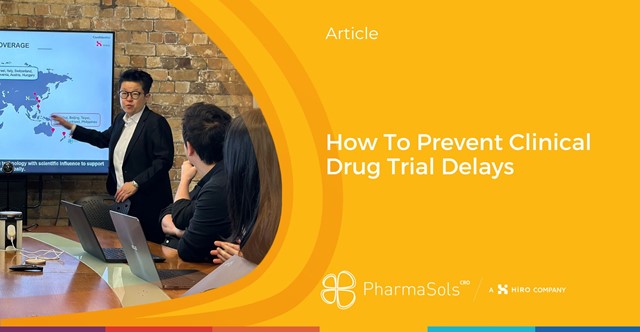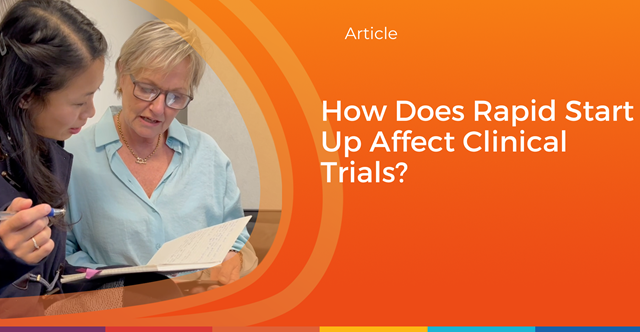16 Nov
The Impact Your CRO Choice Has on The Quality of Your Trial

Quality is paramount in clinical trials, as it ensures that the data collected is reliable and that the trial results are meaningful. However, achieving quality can be challenging, given the many factors that can impact the success of a trial.
This blog post will explore the importance of quality in clinical trials and discuss some key strategies that sponsors and CROs can adopt to ensure that their trials are conducted to the highest standards. We will also highlight the benefits of working with a CRO that is committed to quality without compromise.
The ‘cost’ of quality
Clinical trials take an average of six to seven years to complete, with less than a 12% success rate¹.
Ineffective recruitment strategies lead to prolonged timelines and can introduce bias or variability, undermining the robustness of the data. Moreover, high dropout rates often result in incomplete datasets, threatening the statistical power and validity of the trial findings.
Quality in clinical trials is not just about meeting regulatory standards; it's about ensuring that the collected data reliably reflects the safety and efficacy of the potential treatment. Delays and missteps in trial planning and execution can have a cascading effect on this aspect.
Collaboration
Working closely from the start, sponsors and CROs can design and plan trials carefully, aiming to meet top-quality standards at every phase. This collaboration combines the sponsor's knowledge of the drug being tested with the CRO's expertise in running trials efficiently, leading to a well-managed trial process from start to finish.
A consistent team throughout the trial means a deeper understanding of the trial objectives, leading to better focus and careful attention to details, which are essential for quality outcomes. This stability also helps to avoid mistakes that could affect the trial’s results, keeping the trial on track to meet both scientific and regulatory requirements.
The joint management approach allows sponsors and CROs to tackle problems early and use international insights and new strategies to keep quality high. They work together to smartly assign resources, ensuring the trial is carried out correctly, and the results are trustworthy.
Flexibility
A CRO's capacity to adapt swiftly and efficiently to a sponsor's evolving needs is essential. Boutique CROs often excel in this regard, offering more personalised attention and the flexibility to customise their services to the sponsor's specific goals.
Boutique CROs can typically pivot more rapidly due to their leaner structures and focused expertise, allowing for the swift incorporation of cutting-edge practices that enhance trial effectiveness and quality.
Their size and agility enable them to scale services up or down as needed, ensuring sponsors receive tailored support that aligns with both immediate and future project demands. This flexibility results in a highly responsive and collaborative approach to clinical trial management, contributing to more efficient and higher-quality outcomes.
Experience
The historical performance of a CRO, evidenced by its work on similar projects, is indicative of its ability to navigate the intricacies of a new trial.
Furthermore, integrated global capabilities are essential, especially when a study requires an understanding of specific local regulatory landscapes.
Local CROs bring the advantage of existing, trusted relationships with site personnel and regional experts. These connections are crucial for obtaining insights into potential issues, aligning study designs with local standards of care, and understanding certification requirements such as Good Manufacturing Practice (GMP) for sponsors initiating clinical trials in the region.
Regional choice
The advantage for global sponsors engaging with Australia and New Zealand (ANZ) lies in the efficiency of the clinical trial regulatory framework. In these countries, there is no requirement for an Investigational New Drug (IND) application, which is a prerequisite in jurisdictions like the United States under the Food and Drug Administration (FDA).
This allows for a faster initiation of clinical studies, with the possibility of conducting parallel applications with the FDA. Approval in ANZ can be obtained more quickly, enabling the commencement of studies and the use of the data collected to support FDA applications.
The data produced from clinical trials in ANZ is recognised for its high quality and is accepted by major international regulatory bodies, including those in the US, European Union, and China. This recognition can reduce timeframes significantly due to the streamlined ethics and regulatory (E&R) processes in ANZ.
Additionally, the costs associated with regulatory submissions in ANZ are relatively lower when compared with the United States and Europe. The lack of an IND application requirement can save sponsors up to a year in regulatory timelines, along with considerable financial resources.
Moreover, proven patient recruitment and retention rates in ANZ contribute to the generation of this high-quality data, reinforcing the region's position as an advantageous location for conducting clinical trials.
PharmaSols ‘quality without compromise’
At PharmaSols, our goal is to consistently provide the necessary support to our clients in gathering reliable data from their clinical trials, which begins with maintaining a high standard of quality within our own operations.
PharmaSols holds international IAOCR accreditation and conducts internal EMS audits. We have established quality systems that adhere to both domestic and global regulatory requirements. Our team includes skilled QA managers who are responsible for maintaining our company’s quality standards. Notably, in audits conducted from 2017 to June 2023, PharmaSols had no critical findings, underscoring our dedication to quality.
[1] PhRMA (2015) Biopharmaceutical Research & Development: The Process Behind New Medicines
Other News
March 2024 (1)
February 2024 (1)
December 2023 (1)
November 2023 (1)
October 2023 (1)
September 2023 (2)
August 2023 (1)
July 2023 (1)
June 2023 (2)
May 2023 (3)
April 2023 (1)
March 2023 (2)
The Go-to region for clinical trials (1)
HiRO – our global advantage, tailored solutions and key partnerships (1) (1)
HiRO – an emerging full-service global CRO (1)
HiRO – Top CRO in APAC 2022 (1) (1)
November 2022 (1)
October 2022 (1)
September 2022 (1)
August 2022 (1)
July 2022 (1)
June 2022 (1)
May 2022 (1)
April 2022 (1)
March 2022 (1)
January 2022 (1)
December 2021 (1)
November 2021 (1)
October 2021 (2)
September 2021 (2)
August 2021 (3)
July 2021 (3)
June 2021 (2)
May 2021 (1)
April 2021 (2)
March 2021 (1)
February 2021 (1)
December 2020 (5)
November 2020 (1)
October 2020 (5)
September 2020 (1)
August 2020 (2)
May 2020 (5)
January 2024 (0)



